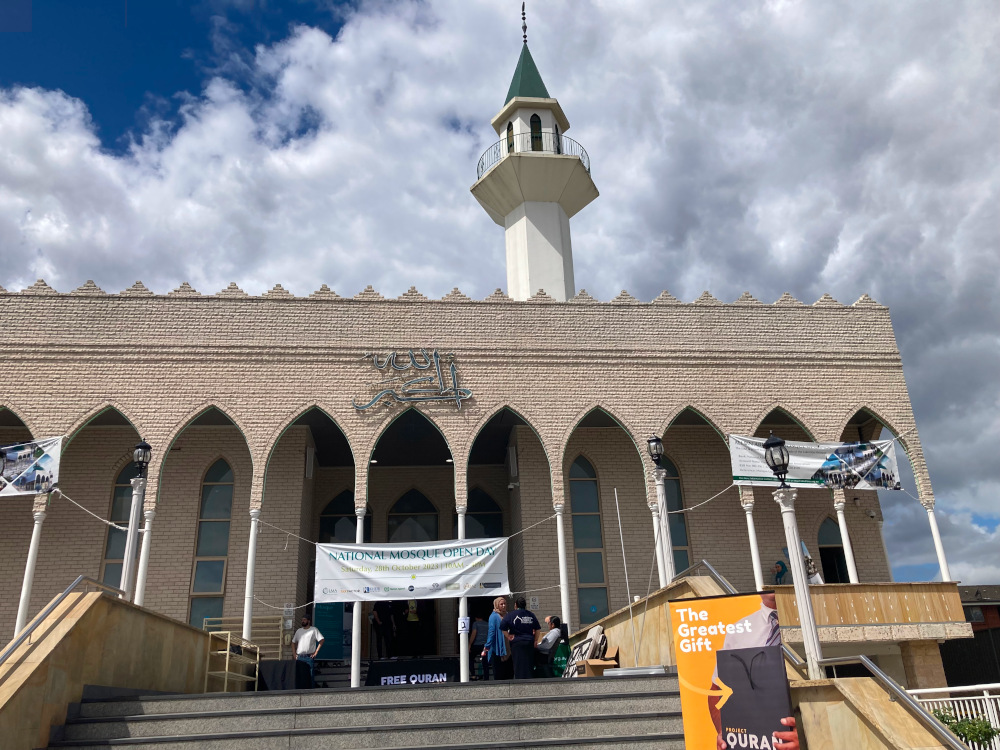Yesterday was a good day to visit a Mosque. That’s because it was National Mosque Open Day. It would have been an equally good day to visit a Synagogue – but it was not their open day, which was a few weeks ago.
A second reason for me was that I had spent a few weeks campaigning for the Yes vote in Muslim areas, so it seemed to me a familiar place to go.
Both the Jewish and Muslim communities are feeling nervous and angry at the present time, and visiting them to say you are thinking of them seems to be a useful act of human solidarity.
Over in the eastern part of my city, Sydney, the blue and white flag of Israel might be flown. In Canterbury Bankstown, the LGA close to where I live, the Palestinian flag, red, green, white and black, is being flown by the local council and a few houses.
I wondered when I turned up at the large Lakemba Mosque whether there would be Palestinian flags flying there – but there weren’t. There was one family of children with the Palestine flag face-painted on their faces, but that was all I could see.
Inside the Mosque, to which the greeting team made we welcome, none of the displays were about Palestine.
There were not many people at the Mosque when I visited mid-afternoon, which made me think of what it is like for a church when only a few might turn up to an evangelistic event.
Because this is what the afternoon turned out to be.
It was a “there is no compulsion in religion” style of Islam on display. That is a quote from the Quran, verse 256 of Al-Baqara – or “the Cow” the second Sura (chapter). “There shall be no compulsion in religion. True guidance is now distinct from error. He that renouces idol-worship and puts his faith in God shall grasp a firm handle will never break. God hears all and know all..” Page 41 The N J Dawood Translation 1999. Penguin 2000
The issue with the verse is about how the Quran is read. Although the Quran was written only over a period of 22 years, early writings are overwritten by later writings. This is called abrogation.
“The Cow” is an early Sura, but the “there is no compulsion in religion” verse is not considered to have been abrogated by many Islamic scholars. The panel I heard at the Lakemba Mosque were in that school – other schools of Islam will have a different view. However, most Islamic scholars do not apply this verse to apostasy – that is, people leaving Islam.
I asked the panel about the many societies that compel people to be Muslims. Their reply was that those societies were corrupt and not following the true principles of religion.
Later I spoke to the female member of the panel, who wore a burka, who described that after converting to Islam, she and her husband went and lived in Saudi Arabia. But she found she did not like how that society practised Islam – she prefers to live in Sydney. The implication was that she found out that Islamic countries can be oppressive.
In the panel discussion, she said she was the daughter of a father she described as a “lay Preacher” in a Christian church I asked her what denomination, and she said “Uniting”. Her journey to Islam was one of seeking Authority – and she said that she had found certainty and purpose in Islam. Christians, in her experience, did not believe in the Bible – her father had not been able to answer her questions about why Christians did not follow it.
What did I find at the Mosque? People determined to evangelise but hospitable as well. It might have been just me imagining things, but I thought there was an unspoken apprehension about the events in Gaza.

